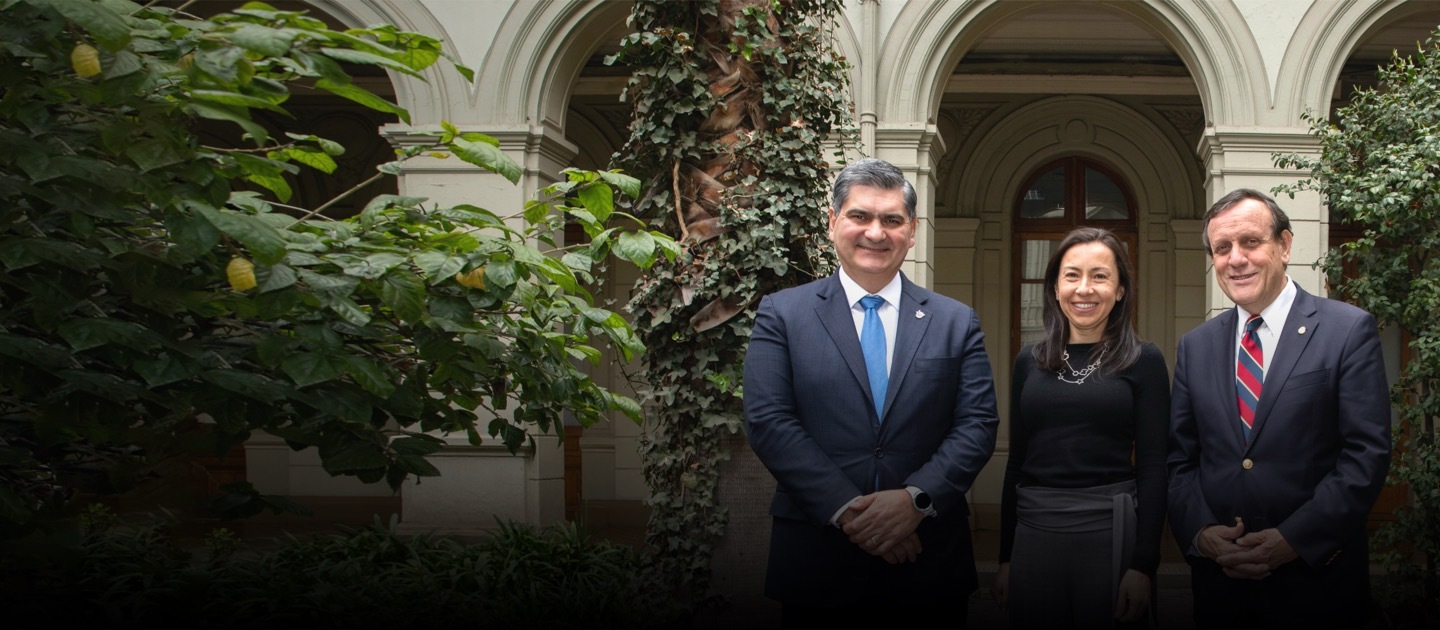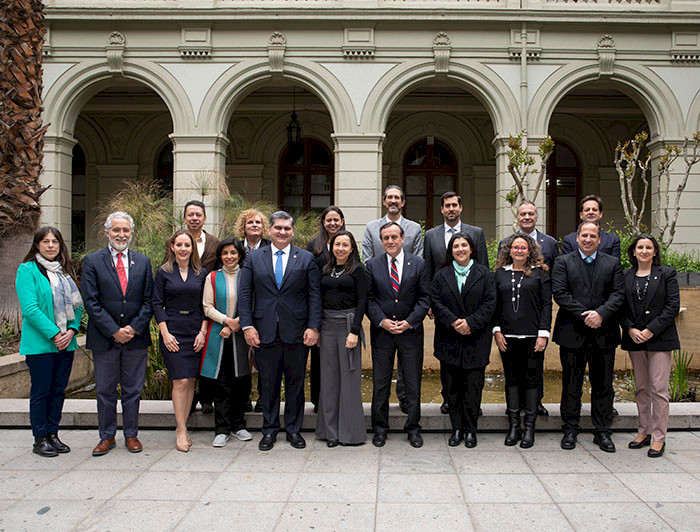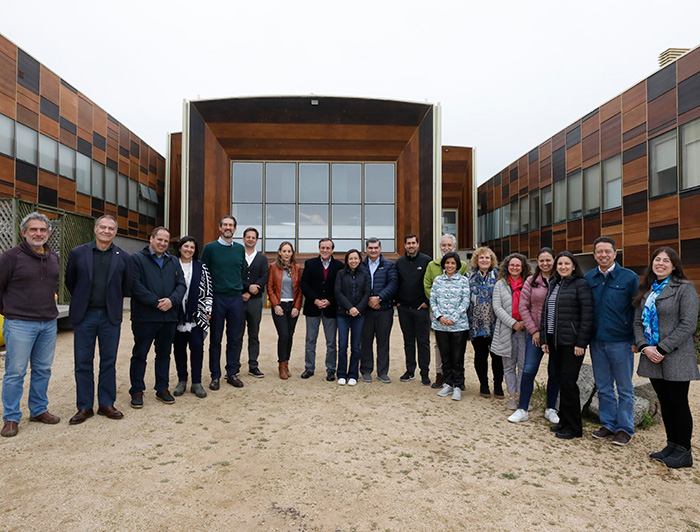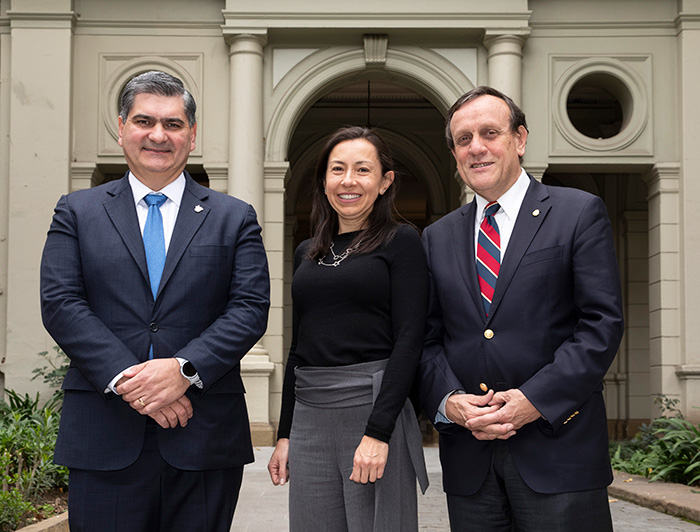
Leading Latin American University Presidents Address Main Higher Education Challenges
Five years after establishing this university alliance, the top officials from UC Chile, Tecnológico de Monterrey in Mexico, and Universidad de los Andes in Colombia convened in Chile. They discussed various topics, including the opportunities and challenges in the region related to early childhood, teaching innovation, digital transformation, sustainability, and scientific research stations.

photo_camera These meetings were led by UC Chile President Ignacio Sánchez, along with Tecnológico de Monterrey President David Garza and Universidad de los Andes President Raquel Bernal.
La Tríada is an university alliance comprising UC Chile, Tecnológico de Monterrey in Mexico, and Universidad de los Andes in Colombia that has successfully developed over 80 academic and research projects in the past five years. The productivity and collaboration were evident during the meeting of university presidents held at UC Chile from October 1 to 3rd. The discussions covered strategic topics for Latin America, including early childhood, challenges and opportunities for the university of the future in sustainable development and interculturality, digital transformation, teaching innovation and transfer, applied ethics, and developing a network of research stations.
During the work sessions held at Coastal Marine Research Station (ECIM UC) in Las Cruces and in Santiago at the Casa Central and San Joaquín Campuses, the achievements of the different work groups were assessed. Established in August 2018, the alliance aimed to foster collaboration and joint efforts among these three non-governmental higher education institutions, which were the top-ranked in the region. The objective was to address the challenges the continent faces collectively.
These meetings were led by UC Chile President Ignacio Sánchez, along with Tecnológico de Monterrey President David Garza and Universidad de los Andes President Raquel Bernal.
"La Tríada was created five years ago together with the Universidad de Los Andes in Colombia and the Tecnológico de Monterrey in Mexico. We share common traits: the high quality of our education, our leadership roles in our respective countries, and our status as public institutions independent of the State. Since our inception, we have consistently worked towards contributing to the development of our countries," said President Sánchez.
The university authority also appreciated the collaborative efforts that have defined the alliance since its inception. "Faculty members from all institutions have collaborated in developing research and teaching projects through shared financing and external funding. This period has substantially grown, marked by academic richness, fostering trust, and building strong connections."
The region's diverse challenges are an added incentive for these institutions to work together. "Universities can no longer operate in isolation. We face shared challenges such as climate change, sustainability, and democracy polarization. We are called to act from a regional and global perspective," expressed President Raquel Bernal. "These alliances allow us to share best practices, build interdisciplinary solutions, innovate through shared efforts, transfer knowledge, science, and technology to contribute to concrete problems in our context, and advance a common development and equity agenda in Latin America."
Executive President David Ganza emphasizes the universities' contributions to La Tríada particularly during the pandemic. "A great example of this is what happened during the COVID-19 pandemic. Sharing best practices among institutions helped us manage the situation internally and significantly contributed to our respective countries and even at the regional level," explained President Garza. Furthermore, during the pandemic, they launched La Tríada on Coursera, a platform where you can find over 100 MOOCs and nine specialized university programs. To date, more than 290,000 students have enrolled in the course.
The university presidents were also accompanied by their respective delegations. Representing Tecnológico de Monterrey were Juan Pablo Murra, Rector for Higher Education; Bruno Zepeda, President of Tecmilenio; Inés Sáenz, Vice President of Inclusion, Social Impact and Sustainability; Ignacio de la Vega, Associate Provost for Academic Affair, Faculty and Internationalization, and Adriana Gidi, Director of International and Strategic Relations. On behalf of Uniandes, Silvia Caro, Vice President for Academic Affairs; Jimena Hurtado, Vice President for Research and Creation; Catalina González, Director of Internationalization; Harold Castro, Executive Director of Digital Transformation, and Juan Camilo Cárdenas, Director of the Center for Sustainable Development, were part of the delegation. For UC, Lilian Ferrer, Vice President of International Affairs; Fernando Purcell, Vice President of Academic Affairs; Pedro Bouchon, Vice President for Research; Ana María Sepúlveda, Executive Director and Director of Global Liaison; María Elena Boisier, Director of Research, and Catalina Gerstmann, Coordinator of Global Liaison, participated.
Early Childhood
Several achievements have been made in early childhood development—a priority area for the partnership—and the three institutions have recently launched the Early Childhood Lecture. A significant milestone in this initiative is the recently launched research competition. The goal is to foster collaborative and transdisciplinary work among the three universities to improve the quality of life and well-being of Latin American children and their families. These are some of the topics the work will focus on:
- Child welfare, the management of adverse childhood experiences, and mental health.
- Maternal and child health and responsive care.
- Investment in early childhood, comprehensive care systems, and early education.
- Urban development, climate change, and their impact on early childhood.
The lecture on early childhood will include seminars, courses, collaborative projects, and developing a web platform to transfer scientific knowledge to the community.
"Early childhood is a fundamental and decisive stage in people's lives. From pregnancy until age five, a significant portion of the skills that will shape individuals for the rest of their lives will develop. Significant investment is needed to ensure the full development of children in the region. Our region allocates relatively minimal resources to early childhood, leading to gaps in early childhood education," explained David Garza.
"By the age of five, children in Latin America from higher socioeconomic backgrounds exhibit the vocabulary typical of a five-year-old, whereas their counterparts from more vulnerable families demonstrate the vocabulary of a three-and-a-half-year-old. In other words, an 18-month language gap," added Raquel Bernal.
"Lack of stimulation at home, lack of quality early education, nutritional deficiencies, and morbidity will have a lasting impact throughout life. Those same children will be less likely to advance in the education system, have reduced access to higher education and quality employment opportunities, and are more likely to experience poverty."
Early intervention could have a significant impact on reducing learning gaps and inequity.
With the collaboration of the FEMSA Foundation and La Tríada, the CUIDA Center implemented a research project involving 200 families in Chile to foster the bonding sensitivity of caregivers for children aged zero to five years, using video feedback techniques for parents participating in kindergarten programs. An exciting project is the development of a MOOC on Coursera, designed to cultivate effective and contextually appropriate practices that promote the fundamental conditions for learning, development, and well-being of children up to six years old.
"With this framework, interdisciplinary projects have been proposed that will allow us to compare the different realities at the international level. The collaborative pursuit of research funds and the backing of the FEMSA Foundation have proven crucial for developing these joint projects," added President Sánchez. The next step will be to apply for additional international funding to strengthen these lines of research. "We hope that this line of research will serve as a distinctive contribution from La Tríada in advancing knowledge and educational support during this crucial stage of life."
A Network for Science

The intention to create a collaborative network of field stations in the scientific field was also discussed at the meeting. Last year, a Memorandum of Understanding (MOU) was signed between La Tríada universities to foster collaboration in research and facilitate exchanges between their respective field stations. This initiative capitalizes on the presence of centers and stations within all the institutions involved. One focus area is enhancing faculty collaboration opportunities on long-term socio-ecological monitoring. Additionally, there is an intention to explore possibilities for the mobility of doctoral students between the scientific stations.
Other topics discussed include the University of the Future and sustainability challenges. The institutions are committed to moving towards carbon neutrality and seeking to generate a culture within their communities that favors carbon footprint reduction and energy efficiency.
Regarding teaching innovation, coordination between the three universities has also been promoted through periodic meetings and joint reflection. During the pandemic, information was collected from various sources to understand the impact of remote teaching on factors such as teaching skills, beliefs about education, personal well-being, and perceptions of learning, among other aspects.
Recently, there have been activities focused on analyzing the effects of artificial intelligence as well. Other topics addressed have been university management and strategies to enhance the well-being of the university community, as well as challenges in curricular and instructional design.
Projections: Master's degree in Latin American Studies
One of the initiatives that has gained relevance is the development of a Master's degree in Latin American studies, which could be taught jointly by the three universities. This project aims to educate graduates who understand the region's historical, cultural, and socioeconomic challenges and are equipped with various interdisciplinary tools.
Currently, UC Chile and Universidad de los Andes are actively involved in developing this plan, and Tecnológico de Monterrey will join them in a collaborative approach by offering specific courses. The project aims to promote inter-university exchange, cultivate interdisciplinary teaching teams, create research opportunities, and advocate for the flexibility of teaching formats in both face-to-face and hybrid modalities. Those who complete the Master's degree program may have the chance to pursue a double or even triple degree in the future, with a projected start date of March 2025.
During the Santiago meeting, several topics were discussed, including digital transformation, work related to applied ethics, presented by Juan Larraín, director of the UC Institute of Applied Ethics; Interculturality, presented by Professor Roberto González, Director of the UC Interculturality Program; and innovation and transfer for regional development.
Adapting to Change

The swift global advancements in science and technology and cultural shifts require universities to adapt their methodologies accordingly. "There is an imperative to better understand the needs of society, the workforce, the sciences, and the arts, along with updating the way we learn, the skills and abilities of our students," stressed President Ignacio Sánchez.
"The teaching methodology must incorporate virtuality, self-learning processes, the ability to search for information, the use of artificial intelligence for teaching purposes, and a novel evaluation approach that focuses more on critical thinking and less on assessing widely available information."
The profile of the students has also changed. According to President Raquel Bernal, these young people are digital natives who care more about the journey than the destination. "Addressing the needs of the digital student, who is accustomed to immediacy and actively engages in a society where technology is omnipresent, presents a significant challenge," she said. The ongoing changes also imply a continuous need for education. "A bachelor's degree will no longer suffice for an individual's life journey as it did in our time. These young individuals will be compelled to pursue continuous education, update their skills, and engage in lifelong learning," she added.
David Garza emphasizes that with the advancement of artificial intelligence and immersive virtual environments in the digital transformation era, coupled with sustainability challenges, the questions of 'what to teach' and 'how to teach,' or more broadly, 'how to educate' become increasingly complex.
"Our current Tec21 educational model is based primarily on challenge-based learning. This initiative was inspired by the challenge of preparing graduates in four years for jobs that may not yet exist, using technologies that have not yet been invented, and addressing problems that we have not yet identified as such," he said.
Looking ahead, he believes that it will be crucial for universities to supplement current teaching models with flexible formats, take a leading role in leveraging new artificial intelligence technologies to enhance teaching, identify competencies that cannot be replicated by an algorithm or robot, and define a multimodal portfolio of teaching formats (classroom, hybrid, distance, synchronous, asynchronous), among other considerations.
The next La Tríada President's Summit will be held between September 29 and October 1, 2024, in Mexico and hosted by the Tecnológico de Monterrey.


